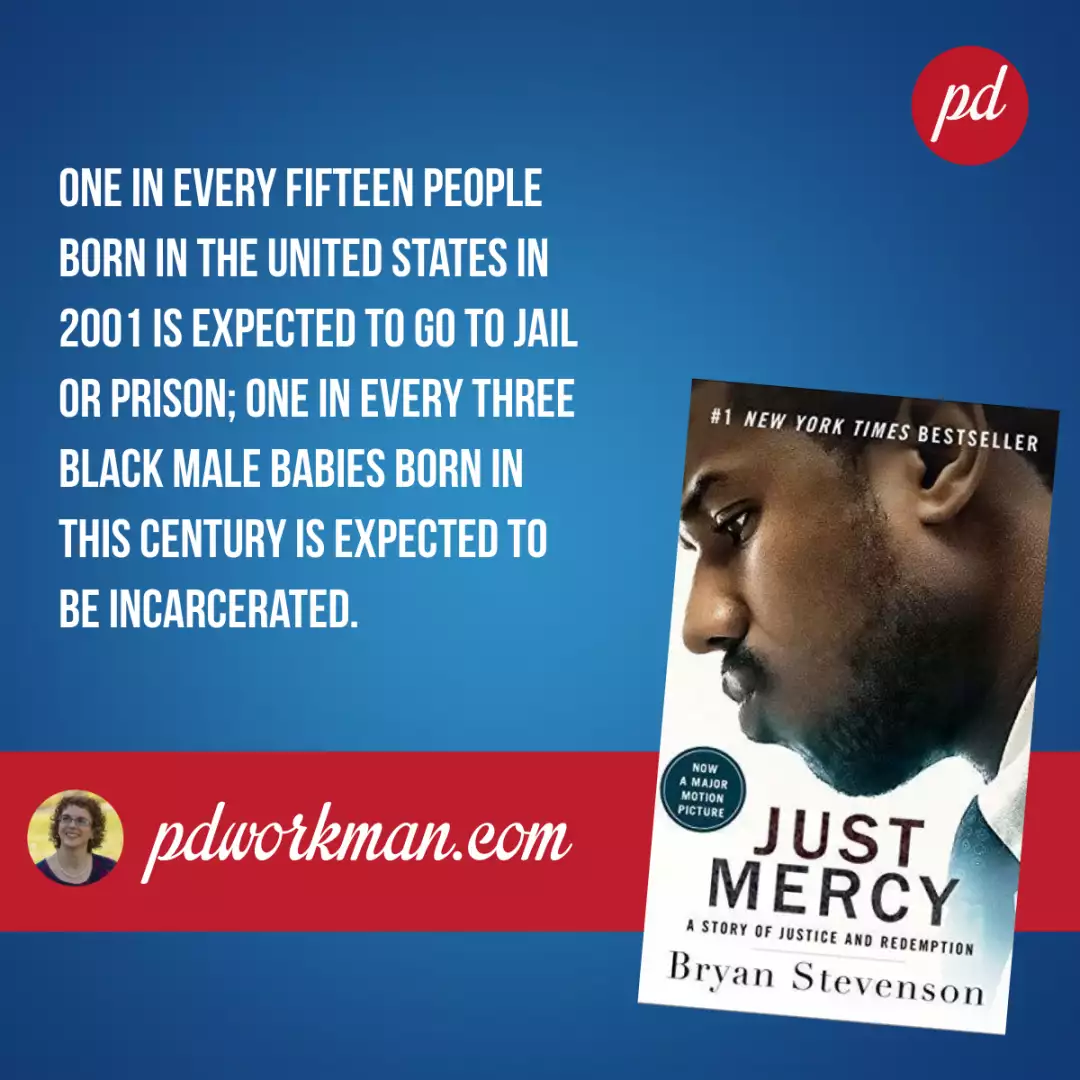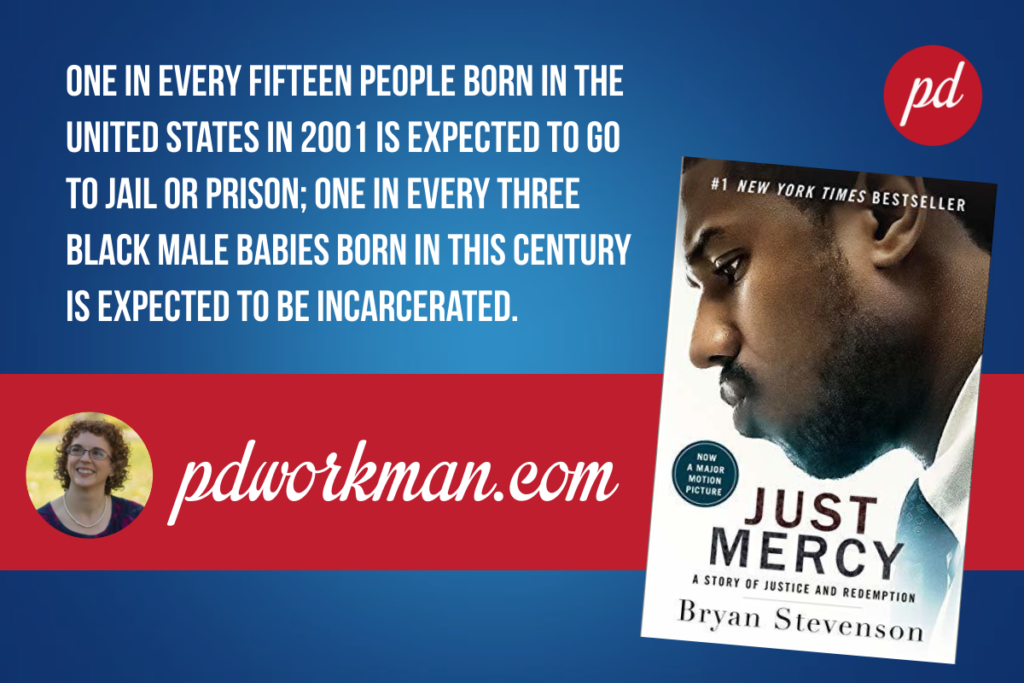
Bryan Stevenson’s quest for change in Just Mercy
May 25, 2021
Have you picked up a copy of my most recent release yet? Hot on the Trail Mix, #15 in the Auntie Clem’s Bakery series is now available!
Teaser Tuesdays is a weekly bookish meme. Read the rules and more teasers at The Purple Booker. Anyone can play along.
I have been fascinated with reading Just Mercy by Bryan Stevenson. It is full of amazing and heartbreaking stories of injustice, with lots of details about the changes in the law over the decades, statistics, and how these changes to the justice system have worked or not worked to the advantage of the poor, marginalized, and disadvantaged.
I was struck within the first few lines of Just Mercy about the similarities between it and Grisham’s A Time for Mercy, which I just finished reading. Both are about young lawyers working on innocence projects and getting people off of death row. Both are filled with a number of different stories of how people were unjustly sentenced to death within a system that punishes the poor while letting the rich go free or get off on much reduced charges.
Then I reached the point in Just Mercy where the narrator describes going to see Charlie, a young teen boy who has been charged with murder. Grisham’s book centers around his Jake Brigance character’s defense of a similar boy. The more Stevenson revealed about the circumstances about the case in his book, the more similar they were. Each the story of a small, shy teen who shoots his stepfather who is passed out in his bed after coming home drunk and knocking out the boy’s mother in the kitchen. He thinks she is dead and uses the stepfather’s own gun to kill him. The stepfather, as well as being a violent drunk, is also a police officer in the small town.
I couldn’t believe the similarities between the two stories. Stevenson was ripping off Grisham! I know that plots are not protected by copyright laws, but the two were so clearly telling the same story. So I searched up both books together, and silly me—Stevenson’s Just Mercy is autobiographical, and Grisham has fictionalized the actual case that Stevenson represented and reported on. In fact, here is what Grisham says in his review of Just Mercy on Goodreads:
⭐️⭐️⭐️⭐️⭐️ Not since Atticus Finch has a fearless and committed lawyer made such a difference in the American South. Though larger than life, Atticus exists only in fiction. Bryan Stevenson, however, is very much alive and doing God’s work fighting for the poor, the oppressed, the voiceless, the vulnerable, the outcast, and those with no hope. Just Mercy is his inspiring and powerful story.
John Grisham
I echo his sentiments. The work that Stevenson has done is amazing and has changed the lives of countless people. This is one book that I may pick up in print after I finish reading it on Overdrive/Libby. While Grisham does a great job of garnering the reader’s sympathy for Drew Gamble, (his fictionalization of Charlie,) and telling his story, I am disappointed by the fact that he used his existing Jake Brigance character, a white man, as the lawyer, and that Brigance was forced into representing Drew. I think this does a disservice to Bryan Stevenson, a Black lawyer who took on Charlie’s case willingly.
Just Mercy has been made into a motion picture and you can see Bryan Stevenson on TED Talks:
So, on to the teaser:
When I first went to death row in December 1983, America was in the early stages of a radical transformation that would turn us into an unprecedentedly harsh and punitive nation and result in mass imprisonment that has no historical parallel. Today we have the highest rate of incarceration in the world. The prison population has increased from 300,000 people in the early 1970s to 2.3 million people today. There are nearly six million people on probation or on parole. One in every fifteen people born in the United States in 2001 is expected to go to jail or prison; one in every three black male babies born in this century is expected to be incarcerated.
Bryan Stevenson, Just Mercy (2014)

Bryan Stevenson was a young lawyer when he founded the Equal Justice Initiative, a legal practice dedicated to defending those most desperate and in need: the poor, the wrongly condemned, and women and children trapped in the farthest reaches of our criminal justice system. One of his first cases was that of Walter McMillian, a young man who was sentenced to die for a notorious murder he insisted he didn’t commit. The case drew Bryan into a tangle of conspiracy, political machination, and legal brinksmanship—and transformed his understanding of mercy and justice forever.
Just Mercy is at once an unforgettable account of an idealistic, gifted young lawyer’s coming of age, a moving window into the lives of those he has defended, and an inspiring argument for compassion in the pursuit of true justice.
Originally blogged at pdworkman.com